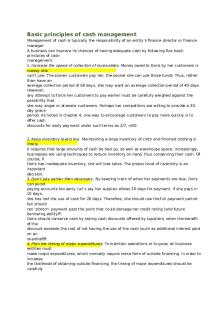Basic principles of cash management PDF

| Title | Basic principles of cash management |
|---|---|
| Author | Nguyễn Thảo Anh |
| Course | Accounting IA |
| Institution | Macquarie University |
| Pages | 2 |
| File Size | 133.9 KB |
| File Type | |
| Total Downloads | 19 |
| Total Views | 165 |
Summary
the assumed knowledge for week 1. you can use this to revise your knowledge from Finance 1A...
Description
Basic principles of cash management Management of cash is typically the responsibility of an entity’s finance director or finance manager. A business can improve its chances of having adequate cash by following five basic principles of cash management. 1. Increase the speed of collection of receivables. Money owed to Doris by her customers is money she can’t use. The sooner customers pay her, the sooner she can use those funds. Thus, rather than have an average collection period of 60 days, she may want an average collection period of 40 days. However, any attempt to force her customers to pay earlier must be carefully weighed against the possibility that she may anger or alienate customers. Perhaps her competitors are willing to provide a 30day grace period. As noted in chapter 4, one way to encourage customers to pay more quickly is to offer cash discounts for early payment under such terms as 2/7, n/30.
2. Keep inventory levels low. Maintaining a large inventory of cloth and finished clothing is costly. It requires that large amounts of cash be tied up, as well as warehouse space. Increasingly, businesses are using techniques to reduce inventory on hand, thus conserving their cash. Of course, if Doris has inadequate inventory, she will lose sales. The proper level of inventory is an important decision. 3. Don’t pay earlier than necessary. By keeping track of when her payments are due, Doris can avoid paying accounts too early. Let’s say her supplier allows 30 days for payment. If she pays in 10 days, she has lost the use of cash for 20 days. Therefore, she should use the full payment period but should not ‘stretch’ payment past the point that could damage her credit rating (and future borrowing ability). Doris should conserve cash by taking cash discounts offered by suppliers, when the benefit of the discount exceeds the cost of not having the use of the cash (such as additional interest paid on an overdraft). 4. Plan the timing of major expenditures. To maintain operations or to grow, all business entities must make major expenditures, which normally require some form of outside financing. In order to increase the likelihood of obtaining outside financing, the timing of major expenditures should be carefully
considered in light of the entity’s operating cycle and cash flows. Expenditure that is made at a time when the entity normally has excess cash places less stress on the entity’s cash resources.
5. Invest idle cash. Cash on hand earns little, if anything at all. An important part of the finance manager’s job is to ensure that any excess cash is invested, even if it is only overnight. Many businesses, such as Doris’s clothing business, are seasonal. When she has excess cash, she should invest it. To avoid a cash crisis, it is very important that these investments be highly liquid and risk-free. A liquid investment is one with a market in which someone is always willing to buy or sell the investment. A riskfree investment means there is no concern that the party will default on its promise to pay its principal and interest. For example, using excess cash to purchase shares in a small company because you heard that the shares were probably going to increase in value in the short term is totally inappropriate. First, the shares of small companies are often illiquid. Second, if the shares suddenly decrease in value, you might be forced to sell them at a loss in order to pay your accounts as they come due. The most common form of liquid investment is interest-bearing government securities...
Similar Free PDFs

Basic Principles of Microbiology
- 6 Pages

Basic Principles of ultrasound
- 38 Pages

Basic Principles OF Fascism
- 5 Pages

Basic Principles of Heredity
- 23 Pages

BASIC PRINCIPLES OF TAXATION
- 46 Pages

2-Basic Principles of Heredity
- 23 Pages

Basic Principles of Power Electronics
- 312 Pages

Principles of Management Notes
- 60 Pages

Principles OF Management MCQ
- 2 Pages

Principles of management
- 55 Pages

14 Principles OF Management
- 4 Pages

MCQ Management of principles
- 2 Pages
Popular Institutions
- Tinajero National High School - Annex
- Politeknik Caltex Riau
- Yokohama City University
- SGT University
- University of Al-Qadisiyah
- Divine Word College of Vigan
- Techniek College Rotterdam
- Universidade de Santiago
- Universiti Teknologi MARA Cawangan Johor Kampus Pasir Gudang
- Poltekkes Kemenkes Yogyakarta
- Baguio City National High School
- Colegio san marcos
- preparatoria uno
- Centro de Bachillerato Tecnológico Industrial y de Servicios No. 107
- Dalian Maritime University
- Quang Trung Secondary School
- Colegio Tecnológico en Informática
- Corporación Regional de Educación Superior
- Grupo CEDVA
- Dar Al Uloom University
- Centro de Estudios Preuniversitarios de la Universidad Nacional de Ingeniería
- 上智大学
- Aakash International School, Nuna Majara
- San Felipe Neri Catholic School
- Kang Chiao International School - New Taipei City
- Misamis Occidental National High School
- Institución Educativa Escuela Normal Juan Ladrilleros
- Kolehiyo ng Pantukan
- Batanes State College
- Instituto Continental
- Sekolah Menengah Kejuruan Kesehatan Kaltara (Tarakan)
- Colegio de La Inmaculada Concepcion - Cebu



